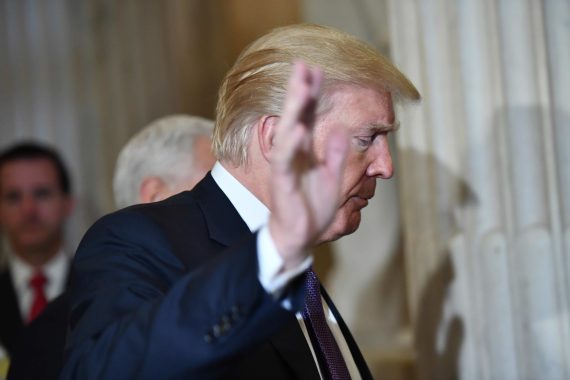The US is a Joke was the title of the travel book Enis Batur wrote many years ago. In a chapter of his book, he signified that even those who have never been to the US knew the country very well. It was a well-known place. A country that everyone has something to say about. It’s a dream for some, it’s the power behind everything for others. The social, cultural and economic impact it created affects everyone in certain ways. This is why the US is well known by almost everyone. For this reason, there have been different expectations from the US.
Recently however, this imagined US began to confuse us. While failing to live up to the expectations, the country became increasingly ambiguous. Those trying to understand the US were shocked at every milestone. We began to face a mechanism which we knew little about. There were peculiar developments in its foreign and security policies. Regression of the US was always analyzed over education, infrastructure and the growth of its rivals. However, unexpected developments surpassing all of these started to occur. The November elections revealed another face of the US, never-ending gossips about Russia showed the system’s inability, and the disparity between cabinet members and the president witnessed by the public demonstrated the dysfunctional nature of basic mechanisms.
Improvidence of the super power
For some, all of these were explainable as they were able to rationalize these situations and issues. Yet, the matter was the fact that this wasn’t expected from a country that is deemed a super power. Many expressed that they never knew this side of the US. In reality, the US has been facing such events for the most of its existence. It’s a mechanism that is full with pitfalls created by its own defense policies, that has power struggles between different institutions that eclipse state policies and which love to ask questions like “who lost Iran?” or “why don’t they like us?” after foreign policy crises. Despite all of its natural resources, world-renowned universities, innovative engine and attractiveness, it’s a power suffering from improvidence in terms of foreign policy and security.
We’re talking about a country that has launched Facebook and Firefox, found rocks that indicated Mars had water in the past through NASA and tortured prisoners in Abu Ghraib prison, all in the same year.
While Steve Jobs was revolutionizing the technology industry in 2001 with the first iPod, the US was betraying its own norms establishing the Guantanamo Camp with the proposal of several security experts. While 8 out of 9 Nobel prizes were given to scientists employed by its universities in 2003, following the ideas of a group of ideologues the US invaded Iraq, leading to one of the greatest fiascos of its history. We’re talking about a country that has launched Facebook and Firefox, found rocks that indicated Mars had water in the past through NASA and tortured prisoners in Abu Ghraib prison, all in the same year. This asymmetry and contradiction in different fields sometimes seems like a bad joke. Just like what Enis Batur asserted. Sometimes it’s really confusing.
The US turns all into conspiracy theorists
The meaning we ascribe to the policies of the US turns us all into so-called conspiracy theorists. In fact, all of us are right to a certain extent. We’re facing a situation in which a former vice president has won a Nobel Peace Prize for his movie on global warming, while the current president has withdrawn from the Paris Climate Agreement; a situation in which Obama was awarded with the Nobel Peace Prize without any accomplishment, while he was indifferent to the greatest tragedy since World War II. It seems normal to have certain challenges in understanding and ascribing meanings.
The issue is that no one expects such clumsy security and foreign policy strategies from a very qualified group of people. We’re peculiarly hopeful that all strategies are implemented taking long-term goals and various factors into consideration. We try to explain false methods of relations more than it deserves.
Turkey has been doing this for the last three or four years. It’s trying to make sense out of the US policies in bilateral relations and attempting to correct certain mistakes. Since the US began to provide military support to the YPG three years ago, Turkey has been trying to explain that the YPG and the PKK are of the same essence. Moreover, Turkey has been trying to explain why military support to the YPG is a security risk for the country and why eradicating a terrorist organization with another is problematic. In reality, most US officials are aware of the situation. This plan of not having an exit strategy, upsetting the ethnic balance in the region and deteriorating relations with Turkey are all troublesome. However, this policy is still on the go with a despair that is assumed not fitting of the US officials.
Recommended
Most US officials are aware of the situation. This plan of not having an exit strategy, upsetting the ethnic balance in the region and deteriorating relations with Turkey are all troublesome.
The US pawns its YPG strategy asserting that it doesn’t have any other partners other than the terrorist organization. A country that has been shaping diplomacy and international relations along with determining paradigms and discourses is breaking its half-century-long alliances over the battle plans of several careerist officials against Daesh. Similarly, the US doesn’t want to empathize with Turkey regarding the trauma caused by the July 15 coup attempt or the threat that FETO is posing to the country. Moreover, the US seems unaware that its indifference towards Turkey’s demands is harming the trust relations between the two countries. Despite all, the US expects Turkey to act normal, as if nothing has happened. Seemingly, the US doesn’t care about the erosion of trust caused by not maintaining the alliance and security relations expected from an ally.
A country that has been shaping diplomacy and international relations along with determining paradigms and discourses is breaking its half-century-long alliances over the battle plans of several careerist officials against Daesh.
Nowadays, Turkey approaches any positive development with cautious optimism. Turkey expected the US to say yes to a safe zone in Syria in order to save civilian lives, considering that the US previously carried out the operation in Kosovo – just like Turkey expected the US to adhere to the international norms it advocates and its own “red line” after the chemical attacks in Syria. Or just like the US was expected to condemn the coup in Egypt, as the US had stated that it wants to be on “the right side of history” a couple of years prior.
Turkey – from confusion to resentment
The initial confusion of Turkey was replaced with resentment. However, it seemed like it was out of control for the US administration. As if to prove the long present conspiracy theories, US officials began to post photos together with PKK militants. US soldiers with the YPG blazon is an image that won’t be forgotten for many years in Turkey. While we were thinking that it couldn’t get any worse, the visa process to Turkish citizens were announced to be halted by the US embassy. At this point, the reason is irrelevant. The US has implemented a policy to Turkey and Turkish citizens that hasn’t been implemented to Russia – despite investigations about Russian interference in the US elections and ongoing intelligence wars – or any other NATO ally. This spiced up the present resentment and distrust towards the US over the issues of PKK and the Gulenist criminal cult (FETO).
The US has implemented a policy to Turkey and Turkish citizens that hasn’t been implemented to Russia – despite investigations about Russian interference in the US elections and ongoing intelligence wars – or any other NATO ally.
We’re not sure what those who proposed and implemented this visa suspension want to achieve, as we were unable to understand what the US wants in previous instances. I believe it’s not hard to assert that the US has emotionally fractured its bilateral relations with Turkey. The US merely added another to its list of public catastrophes. The political dimension of this decision could be managed through bilateral meetings and communications. However, it should be admitted that it has created a negative attitude towards the US in various circles of Turkish society. This will pressure foreign policy makers in the long-term.
If this continues to be the case and the US’s reactions continue to be confusing, queries about the US alliance reliability will be replaced with queries about the reliability of the US. The unpredictable and coarse approach of the US towards its allies will affect its future alliances. The confusion and resentment towards the US policies won’t be understood just as a bad joke anymore. People will begin to ask the question The US is a Joke, Dear Frank, But How Much Can We Laugh at It – as the full title of Batur’s book. The regression of the US will speed up when this happens and when the US constrains itself with the means to punish its allies and when it begins to be deemed as a distrusted super power.





